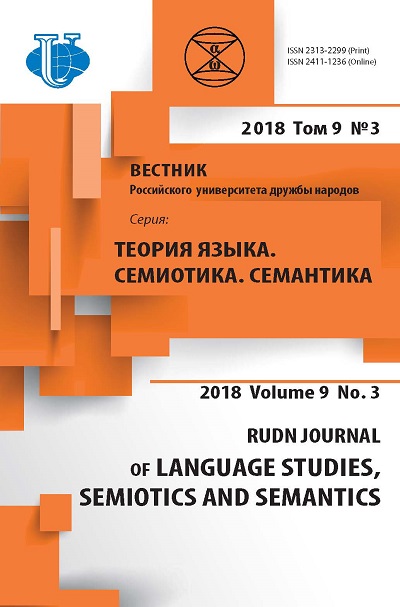THE CONTENT AND THE STRUCTURE OF THE NUCLEAR AND CIRCUMNUCLEAR ZONES OF LEXICAL-SEMANTIC FIELD “INTERPERSONAL RELATIONS” ON THE MATERIAL OF F. DOSTOEVSKY’S NOVEL “THE IDIOT”
- Authors: Denisenko V.N1, Romanova I.A1
-
Affiliations:
- RUDN University
- Issue: Vol 9, No 3 (2018)
- Pages: 625-639
- Section: FUNCTIONAL SEMANTICS
- URL: https://journals.rudn.ru/semiotics-semantics/article/view/19429
- DOI: https://doi.org/10.22363/2313-2299-2018-9-3-625-639
- ID: 19429
Cite item
Full Text
Abstract
The article discusses the structure of lexical-semantic field “interpersonal relations” based on the novel “The Idiot”, by F. Dostoevsky. In the article we describe the set of lexical item representing the field, as well as the place of units of the field in the author's style. The subject of the research was chosen by the relevance of studying vocabulary as a layer of a literary language that discloses information about the material and spiritual culture of society. The relevance of this work can also be considered from the point of view of the need for the development of a comprehensive methodology for the linguistic analysis of semantic relations within the lexical-semantic field “interpersonal relations”. Our goal is to highlight all the variety of units of lexical-semantic field “interpersonal relations” used in F.M. Dostoevsky’s novel. Also we want to reveal the uniqueness of their contextual use, as well as to trace the dynamics of relations and at the same time the change in the lexical content as for relation descriptions between characters. We have developed criteria for selecting lexical markers. We used continuous sampling method, analysis of vocabulary definitions and componential analysis during the preparation of the article. It is established that the lexical-semantic field “interpersonal relations” is a clearly structured system, a well- structured system, which units are united by common semantic features. The pre-nuclear zone is made up of units united by the name of field “relation”, but with a small number of differential signs. In the field we are considering, these are 'negative attitude', 'positive attitude', 'intense', 'non-intensive', 'benevolence', 'hostility', 'sympathy', 'pity', 'indifference'. These features determine the structure and place of the field we are considering in the lexical-semantic system of the Russian language, helping to native speakers’ mind to expand the idea of the content and structure of the lexical-semantic field “interpersonal relations”. Most of the vocabulary of lexical-semantic field “interpersonal relations” are words with a high emotional code that characterizes the author’s style. The linguistic personality of Dostoevsky can be called an individually and creatively verbalized world view through the prism of the writer's consciousness.
About the authors
Vladimir N Denisenko
RUDN University
Author for correspondence.
Email: denissenko@mail.ru
the Head of Department of General and Russian Linguistics of RUDN University; Interests: Interests semantics, phonetics, morphology and lexicology of the modern Russian language, as well as problems of General and Russian linguistics
6, Miklukho-Maklaia str., Moscow, Russia, 117198Irina A Romanova
RUDN University
Email: irina.aleks.romanova@gmail.com
postgraduate student of the Department of General and Russian Linguistics of RUDN University; Interests: Interests semantics, lexicology of the modern Russian language, linguistic security
6, Miklukho-Maklaia str., Moscow, Russia, 117198References
- Bosova, L.M. (1997). The Problem of Correlation of Semantic and Conceptual Fields of Qualitative Adjectives. [dissertation] Barnaul. (In Russ.).
- Karaulov, Ju.N. (1976). General and Russian Ideography. Moscow: Nauka publ. (In Russ.).
- Trier, J. (1931). German vocabulary of the conceptual field of intellectual properties. Germany. (In Germ.).
- Weisgerber, J.L. (2004). The Native Language and the Formation of mind. Moscow. (In Russ.).
- Hallig, R. & Wartburg, W. von. (1963). The system of concepts for compiling dictionaries. Berlin. (In Germ.).
- Carnap, R. (2007). Meaning and Necessity: a Study in Semantics and Modal Logic. Moscow. (In Russ.).
- Wittgenstein, L. (2009). The Tractatus Theologico-Politicus. Moscow. (In Russ.).
- Porzig, W. (1964). The Division of the Indo-European language area. Moscow. (In Russ.).
- Palmer, F.R. (1976). Semantics. A new outline. Cambridge: Cambridge University Press. (In Eng.).
- Novikov, L.A. (2003). Literary Text and Its Analysis. Мoscow. (In Russ.).
- Likhachov, D. (1987). Literature — Reality — Literature. Selected works. Leningrad. (In Russ).
- Morris, Ch. (1938). Foundations of the Theory of Signs. Chacago. (In Eng.).
- Karaulov, Ju.N. (2014). The Russian Language, the Russian Idea and the Author's Style of Dostoevsky. In: Word of Dostoevsky 2014. The Author's Style and world View. Мoscow. (In Russ.).
- Fokin, P. (2013). Dostoevsky. Re-reading. Saint-Petersburg. (In Russ.).
- Perelmuter, J.E. (1971). The Substandard Lexical Features in Dostoevsky's Post-Exile Literary Works. McGill University. (In Eng.).
- Wierzbicka, A. (1999). Understanding Cultures through Key Words. Semantic universals and description of languages. Moscow. (In Russ.).
- Kochetkova, T.V. The Problem of Studying the Linguistic Personality of the Elite Speech Culture Bearer (review). Stylistic Issues, 26, 14—24. Saratov. (In Russ.).
- Vinogradov, V. (1980). Selected Works: The Language of Fiction. Moscow. Nauka publ. (In Russ.).
- Denisenko, V.N. (2007). Semantic field as a means of the comparative study of the English and Russian lexicon. RUDN journal of language education and translingual practice, 3, 5—10. (In Russ.).
- The Library of Russian Classics. Issue 11: Fyodor Dostoyevsky (2010) ed. Bashkova (CD). Moscow. Direct Media. (In Russ.).
- Mishankina, N. (2013). Databases in linguistic research. Lexicography issues, 1(3). Tomsk. (In Russ.).
- Ignatieva, T. (2004). The Lexico-Semantic Field “Interpersonal Relations” in a German Literary Language of the end of 18-the beginning of 19 centuries (on a material of dramatic art of F. Schiller). [abstract of dissertation]. Samara. (In Russ.).
- Karaulov, Ju.N. (2010). Russian Language and Linguistic Personality. Мoscow. (In Russ.).
- Firstova, N.F. & Firstiva, N.A. (2001). F.M. Dostoevsky and Orthodoxy. Integration of education, 1, 45—47. (In Russ.).
- Mochalov, E.V. (2001). F.M. Dostoevsky and the Russian idea. Integration of education, 1, 41—43. (In Russ.).
- Mitina, S. (2001). F.M. Dostoevsky: suffering and freedom. Integration of education, 1. 78—80. (In Russ.)
- Ushakov, D.N. (2000). The Big Explanatory Dictionary of Modern Russian Language. Reprinted edition. Moscow. (In Russ.).
- Linguistic Encyclopedic Dictionary. Yartseva, V.N. (Ed.) URL: http://lingvisticheskiy-slovar.ru/ (accessed: 19.02.2018) (In Russ.).
Supplementary files












